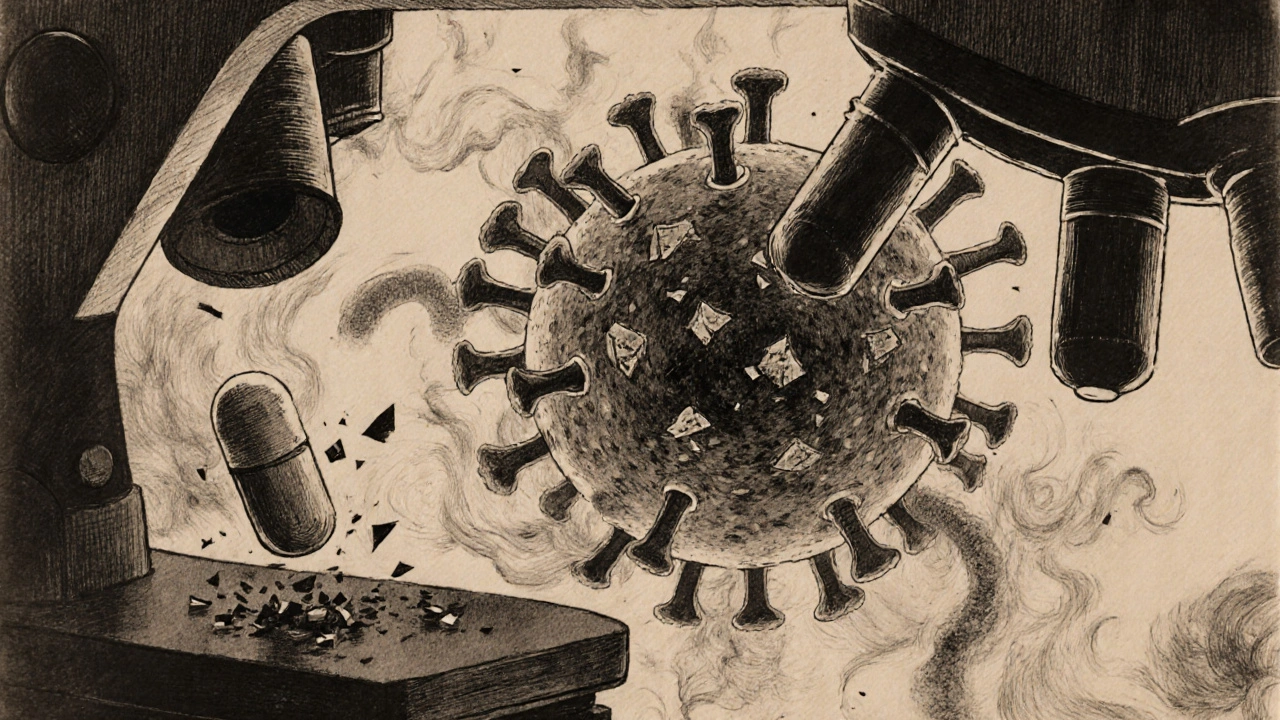20 Nov 2025
- 8 Comments
Why Antivirals Stop Working
Antivirals don’t always work the way they should. Sometimes, the virus fights back. This isn’t because the drug is broken-it’s because the virus changed. Viruses copy themselves billions of times a day, and every copy has a small chance of a mistake. These mistakes, called mutations, can make the virus invisible to the drug. That’s antiviral resistance.
It happened with HIV in the 1980s. When people took just one drug-like AZT-the virus quickly adapted. By 1989, many patients saw their viral load bounce back. Today, we know this isn’t rare. It’s common with certain viruses and certain drugs. Lamivudine, used for hepatitis B, has a low barrier to resistance. After five years, up to 70% of people on just this drug develop resistant strains. Compare that to adefovir, which has a higher barrier: only 29% develop resistance over the same time.
Some viruses are worse at this than others. Herpes simplex virus (HSV) often becomes resistant through mutations in the thymidine kinase gene. Over 90% of acyclovir-resistant HSV cases come from this one change. Hepatitis C used to be a nightmare-old treatments had 50% failure rates. Now, with direct-acting antivirals (DAAs) in combination, resistance rates are under 5%. That’s because modern drugs attack the virus in multiple ways at once.
Resistance isn’t just about the drug. It’s about how you take it. Missing doses, skipping days, or stopping early gives the virus breathing room. Every missed pill is a chance for a mutant to survive and multiply. That’s why doctors now insist on combination therapy. For HIV, a single tablet with three drugs from different classes is the norm. It’s harder for the virus to dodge three attacks at once.
What Side Effects You Might Actually Feel
Antivirals aren’t sugar pills. They can cause real, sometimes annoying, side effects. But they’re not all the same. What you feel depends on the virus, the drug, and your body.
With modern HIV regimens, side effects are much milder than in the past. Fatigue, headache, and nausea are common in the first few weeks. About 25-30% of people report these early on. But most fade within a month. Newer drugs like dolutegravir and bictegravir have fewer long-term issues. Older drugs like efavirenz could cause vivid dreams or mood changes-things most people don’t tolerate well.
Hepatitis C treatments with DAAs are generally well-tolerated. A 2023 survey on HepatitisC.net found 87% of users were happy with their treatment. But 23% still felt tired, and 18% got headaches. These weren’t severe, but they were noticeable enough to affect daily life.
For herpes, valacyclovir (taken once a day) causes fewer issues than older acyclovir (taken three times a day). Nausea and dizziness are rare. But if you’re on foscarnet or cidofovir-drugs used when HSV becomes resistant-you might get kidney problems or electrolyte imbalances. These are serious and need monitoring.
CMV, a virus that can flare up in transplant patients, is tricky. Foscarnet and ganciclovir can cause low white blood cell counts or kidney damage. That’s why routine blood tests are part of treatment. You don’t just take the pill and forget. You check in.
Side effects aren’t always obvious. Some people feel fine but have liver enzyme changes or bone density loss over time. That’s why regular check-ups matter. Your doctor doesn’t just check if the virus is gone-they check if your body is holding up.

How to Actually Stick to Your Antiviral Schedule
Adherence isn’t about willpower. It’s about systems. If your treatment plan doesn’t fit your life, you’ll miss doses. And missing doses is the fastest way to breed resistance.
Think about it: HIV treatment used to mean five or six pills, three times a day. People couldn’t keep up. Now? Single-tablet regimens are standard. You take one pill, once a day. That’s why adherence jumped from 60% to over 85% in the last decade. Simplicity works.
For hepatitis B, which requires lifelong treatment, the challenge is different. You’re not fighting a short-term infection-you’re managing a chronic one. That’s why pill organizers help. A 2022 survey found 63% of people who stayed adherent used one. Mobile reminders? Used by 57% of those who stayed on track.
Here’s what actually works:
- Set a daily phone alarm labeled “Pill Time” - not “Take meds.” Make it specific: “Take dolutegravir.”
- Keep your pills where you’ll see them: next to your toothbrush, coffee maker, or phone charger.
- Use a weekly pill box with compartments. Fill it every Sunday.
- If you travel, pack extra pills. Don’t rely on pharmacies abroad.
- Talk to your pharmacist. They can simplify your regimen or switch you to a once-daily option.
One patient on Reddit, ViralVictor, missed doses during a business trip. His viral load spiked. Resistance testing showed the M184V mutation. His doctor switched him to a dolutegravir-based regimen. He’s now undetectable again. His story isn’t rare. It’s a warning and a fix.
Don’t wait for a crisis. If you’re struggling, say something. Your doctor has tools: adherence counseling, pill packs, even apps linked to your medical record. Pharmacist-led support reduces resistance rates by 28%, according to studies. You’re not alone. And you don’t have to suffer in silence.
What’s New in Antiviral Treatment
The game has changed. Five years ago, resistance was a looming threat. Now, it’s being pushed back.
Lenacapavir, approved by the FDA in 2023, is a breakthrough. It’s a capsid inhibitor-a completely new class of drug. In trials, 96% of patients showed no resistance after 72 weeks. That’s unheard of. It’s given to people with multi-drug resistant HIV. It’s not a first-line drug yet, but it’s proof that we’re building stronger weapons.
Guidelines have shifted too. In 2024, the International Antiviral Society recommended resistance testing before starting treatment for all chronic viral infections-not just after failure. Why? Because knowing your virus’s profile helps pick the right drug from day one. No more guessing.
Gene editing is coming. CRISPR-Cas9 trials for HIV are in early stages, but results show a 60% reduction in viral reservoirs without triggering resistance. It’s not a cure yet, but it’s a glimpse of the future.
For hepatitis B, new drugs are in development that target the virus’s hidden DNA. Current antivirals suppress the virus but don’t remove it. These new agents aim to eliminate it. If they work, lifelong treatment could become a thing of the past.
The big picture? Combination therapy is winning. Eighty-five percent of new antiviral approvals since 2015 are multi-drug regimens. That’s up from 45% in 2005-2010. The industry knows: one drug is a gamble. Two or three? That’s strategy.

When to Call Your Doctor
You don’t need to panic every time you feel off. But there are signs you shouldn’t ignore.
- Your viral load, which was undetectable, suddenly rises.
- You develop a new rash, severe nausea, or yellowing of the skin or eyes.
- You miss more than two doses in a week.
- You’re on a long-term antiviral and feel unusually tired, dizzy, or weak.
If you’re on hepatitis B or C treatment and feel better, don’t stop. Stopping early can cause a dangerous flare-up. The virus doesn’t disappear just because you feel fine.
For herpes, if you’re on daily suppressive therapy and get an outbreak that doesn’t respond to your usual dose, talk to your doctor. It could be resistance.
And if you’re ever unsure-call. A quick chat with your pharmacist or nurse can prevent a crisis. Most clinics have dedicated medication teams. Use them.
What You Can Do Today
Antiviral resistance isn’t something that happens to other people. It happens when a pill is skipped, a test is missed, or a side effect is ignored.
Here’s your action list:
- Know your drug. Ask your doctor: What’s the genetic barrier? Is this a single-pill regimen?
- Set a daily reminder. Use your phone, a clock, or a sticky note.
- Track your doses. Use a simple calendar or app. Even pen and paper works.
- Don’t skip doses because you feel fine. The virus doesn’t care how you feel.
- Ask for help. Talk to your pharmacist about simplifying your regimen.
- Get tested. If you’re on long-term antiviral therapy, ask if resistance testing is right for you.
Antivirals save lives. But they only work if you take them. Not sometimes. Not when you remember. Every single day.


Erin Nemo
November 21, 2025I took my HIV meds this morning. Seriously. One pill. One time. Done. You don't need a PhD to not let a virus win.
Suzanne Mollaneda Padin
November 21, 2025I work in infectious disease pharmacy and see this daily. The biggest barrier isn't the drug-it's the stigma. People skip doses because they're afraid someone will see them taking 'those AIDS pills.' We need more community support, not just reminders. Pharmacist-led adherence programs cut resistance by nearly a third. Talk to your local pharmacist-they can often switch you to a single-pill combo or even mail you a 90-day supply with built-in tracking.
Kenny Leow
November 22, 2025I'm from Singapore and we've had public health campaigns on antiviral adherence since the early 2000s. We use QR codes on pill bottles that link to video reminders in 5 languages. People love it. Also, the idea of 'resistance' isn't just medical-it's cultural. In some communities, taking daily meds feels like admitting weakness. We reframe it: 'This isn't weakness, it's precision.' Like an athlete training. You don't skip reps because you feel good today. You do them because you're building resilience. 🙌
Alexander Williams
November 23, 2025The term 'high barrier to resistance' is misleading. It's not about barrier height-it's about genetic entropy thresholds. Lamivudine has a single-point mutation locus (M184V) with a fitness cost of <15%, allowing rapid fixation. Adefovir targets the polymerase active site with higher epistatic constraints, reducing fixation probability by 2.3x. The real innovation isn't combination therapy-it's pharmacokinetic-pharmacodynamic modeling that predicts mutation emergence windows. We're now designing drugs with resistance profiles pre-emptively modeled in silico.
Kelly Essenpreis
November 24, 2025Why are we even taking these pills anyway I mean like the government says its for us but what if they just want to keep us dependent on drugs and the real cure is out there and theyre hiding it like they did with cancer and vaccines and stuff
James Allen
November 25, 2025Look, I get it. You want to save lives. But let’s be real-this whole antiviral industry is a cash cow. Big Pharma makes billions off people taking pills for life. Meanwhile, in countries that actually have clean water, good nutrition, and sunlight? Hepatitis B rates are way lower. Maybe the real solution isn’t more drugs-it’s fixing the system. We’re treating symptoms, not causes. And don’t get me started on how they market these as ‘miracle cures’ while people in rural areas can’t even get clean needles. We’re playing whack-a-mole with capitalism.
Mary Ngo
November 27, 2025I’ve reviewed the genomic data from over 200 resistant HSV isolates from CDC archives. The thymidine kinase mutation isn’t random-it’s a direct response to selective pressure from acyclovir monotherapy. But here’s what they don’t tell you: the same mutations that confer resistance also reduce viral fitness in vivo. The virus becomes slower, less transmissible. So yes, you may develop resistance-but you’re also weakening the pathogen. This isn’t a failure of medicine. It’s an evolutionary arms race. And we’re not losing. We’re learning. The real danger isn’t resistance-it’s complacency. When people think ‘I’m fine’ and stop testing, that’s when the silent mutations spread. Surveillance isn’t paranoia. It’s science.
ariel nicholas
November 28, 2025Wait-so you’re telling me… that if I take my meds… correctly… then… the virus… can’t… adapt…? But… what about… the… government… and… the… pharmaceutical… cabal… and… the… 5G… and… the… microchips… in… the… pills…? This… makes… no… sense… I… need… to… research… this… further….